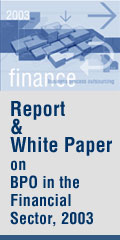|

- Mgt. Courses
- India's Outlook
- BECON-2003
- Micro Finance
- Credit Policy
- Bank Ratings
- Top 15 pages

 Daily News
Daily News
- Banking News
- IT News
- Insurance News
- BPO News
- Market News
 Online Directories
Online Directories
- IT Directory
- BPO Directory
- Bank Directory
- Insurance Cos
 Daily Rates Daily Rates
- Rupee Spot Rates
- Lending Rates
- Stock markets
- FCNR Rates
 Banking
Banking
- Overview
- Basics
- Products
- Articles
- Policies
- More
 Technology
Technology
- Overview
- Major IT Cos
- Banking Software
- Features
- More
 Finance
Finance
- Overview
- Corporate Finance
- M&A & JV
- Venture Capital
- More
 Insurance
Insurance
- Overview
- Regulators
- Bancassurance
- Products
- More
 BPO
BPO
- Overview
- Opportunities
- News & Trends
- More
 Publications
Publications
- BPO Report
- Doing business
- Outsourcing
- NRI Handbook
- Directory
- More
 More sections
More sections
- Jobs
- Management
- NRIs
- Co-op Banks
- Lifestyle
|
Click Here To Return To Daily News
Click For Other Top Stories
A foreign bank or its wholly owned subsidiary regulated by a financial sector regulator in the host country can now invest up to 100% in an Indian private sector bank.This option of 100% FDI will be only available to a regulated wholly owned subsidiary of a foreign bank and not any investment companies. Other foreign investors can invest up to 74% in an Indian private sector bank, through direct or portfolio investment.
The Government has also permitted foreign banks to set up wholly owned subsidiaries in India.The government, however, has not taken any decision on raising voting rights beyond the present 10% cap to the extent of shareholding.
The new FDI norms will not apply to PSU banks, where the FDI ceiling is still capped at 20%.
Foreign investment in private banks with a joint venture or subsidiary in the insurance sector will be monitored by RBI and the IRDA to ensure that the 26 per cent equity cap applicable for the insurance sector is not breached.
All entities making FDI in private sector banks will be mandatorily required to have credit rating. The increase in foreign investment limit in the banking sector to 74% includes portfolio investment [ie, foreign institutional investors (FIIs) and non-resident Indians (NRIs)], IPOs, private placement, ADRs or GDRs and acquisition of shares from the existing shareholders. This will be the cap for any increase through an investment subsidiary route as in the case of HSBC-UTI deal.
In real terms, the sectoral cap has come down from 98% to 74% as the earlier limit of 49% did not include the 49% stake that FII investors are allowed to hold. That was allowed through the portfolio route as the sector cap for FII investment in the banking sector was 49%.
The decision on foreign investment in the banking sector, the most radical since the one in 1991 to allow new private sector banks, is likely to open the doors to a host of mergers and acquisitions. The move is expected to also augment the capital needs of the private banks.
.... Click for Overview of Banking Industry in India
.... Click for Mergers and Acquisitions/ Joint Ventures
|
|
|
|
|
|
|
|
|
|
|
|
|
|
|
|
|
|
|
|
|
|
|
|
|
|
|
|
|
|
|
|
|
|
|
|
|
|
|
|
|
|
|
|
|
|
|
|
|
|
|
|
|
|
|
|
|
|
|
|
|
|
| |

-----------

-----------

-----------

|





